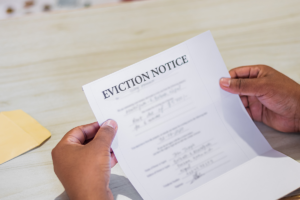Essential Guide to Renters’ Rights—What You Need to Know

Back to School: How to Pay for College Without Loans
08/23/2024
Debt Consolidation vs. Credit Card Refinancing: Which Is Right for You?
09/08/2024Disclaimer: Our content is prepared by our writers for general informational purposes only. We are not attorneys and content on this website does not constitute legal advice. If you need legal advice regarding tenants’ rights, please contact an attorney.
If you are renting a place to call home, your use of the property is protected through renters’ rights (also known as tenants’ rights). Whether you are living in a rental or renting out a property to a tenant, understanding the ins and outs of renters’ rights can make your life easier.
With a firm grasp of renters’ rights, you can be better prepared to navigate rental situations. In this article, we will explore renters’ rights and how they might impact your own life.
Guide to Rental Agreements for Tenants
When you choose to rent a place, you’ll usually need to sign a rental agreement before moving in. In general, rental agreements are divided into month-to-month or fixed-term options. You can find a closer look at both options below.
Month-to-Month Rental Agreement
Month-to-month rental agreements, often referred to as periodic tenancies, are one of the most flexible and common types of rental arrangements. In this arrangement, tenants have the option to rent a property on a month-to-month basis, with no fixed-term commitment beyond the initial month. This flexibility can be advantageous for both landlords and tenants, as it allows renters to have the freedom to move or terminate the lease with relatively short notice, typically 30 days.
Landlords can also benefit from month-to-month agreements as they have the flexibility to adjust rental terms and conditions or to terminate the lease with proper notice, making it easier to adapt to changing circumstances.
Fixed-Term Lease Agreements
Fixed-term rental agreements are another common type of contract between landlords and tenants. These agreements specify a predetermined duration during which the tenant agrees to rent the property, typically ranging from six months to a year or longer.

Fixed-term agreements provide a sense of stability for both parties, as they outline the exact terms and conditions for the duration of the lease, including the rent amount and due date, security deposit, and maintenance responsibilities. They offer tenants the assurance of knowing they can reside in the property for a set period, while landlords benefit from a steady stream of income and the ability to plan for any property-related expenses or vacancies.
However, it’s essential to be aware that these agreements come with less flexibility. For example, breaking the lease before its term may incur penalties, and rent increases are often prohibited until the lease expires or is up for renewal, depending on local laws and the terms of the contract.
Rental Selection Rights for Renters
Renters have the flexibility to apply for any type of rental that suits their needs. But simply applying for a rental doesn’t mean you will land the opportunity to sign a lease agreement. Landlords often receive multiple applications, many of which might be well-qualified to uphold the lease agreement. It puts landlords in a spot to select a tenant who is the best qualified for the place.
Of course, landlords must abide by fair housing laws. Essentially, this means a landlord cannot select a tenant based on a tenant’s race, national origin, sex, religion, family status, or disability. But a landlord can choose to screen applicants based on credit reports, eviction history, and income. Landlords can also consider professional references. In some states, a landlord can consider a potential tenant’s criminal record.
Understanding Your Renter Credit Rights
In terms of building credit, paying your monthly rent on time won’t necessarily lead to a better credit score. That’s because your rent payment activity isn’t automatically reported to the credit bureaus. However, you can enlist the help of a service to get credit for your rental payment activity.
For example, you can use the help of Experian’s RentBureau to build credit history through rental payments. If you want to build credit through rental payments, consider signing up for this type of service.
Security Deposit Best Practices for Tenants
When you finalize a rental agreement, most landlords require a security deposit. This is a predetermined amount of cash that you give to the landlord upon move-in. The landlord holds this money until you move out. If you’ve honored the terms of the lease, you’ll get your security deposit back. But if you’ve damaged the property, the landlord may keep some or all of the funds to cover repair costs.
State Security Deposit Limits & Deadlines
Different states have different security deposit regulations. Most states provide guidelines on how large a security deposit can be, how the funds can be held, and when the landlord must return the deposit to the tenant.
For example, in California, the total amount of the security deposit cannot exceed two times the monthly rent for an unfurnished unit or three times the monthly rent for a furnished unit. Upon the tenant’s move-out, the landlord has 21 days to either issue a full refund of the deposit or provide an itemized statement detailing any deductions made from the deposit, along with reasons for those deductions. The landlord must also include copies of receipts for any charges related to repairs or cleaning, with exceptions. Before vacating, it’s advisable for the tenant to request an “initial inspection” with the landlord to identify necessary repairs and document the unit’s condition through photographs.
If you believe that your landlord illegally withheld your security deposit, start by requesting the return of the deposit in writing. Hopefully, it was an oversight they are willing to correct by returning the funds immediately. But if the landlord doesn’t comply, tenants have the option to take the landlord to small claims court for remediation.
State Security Deposit Statutes
Every state has different rules surrounding security deposits. You can find the specific deposit statutes for your state in this helpful compilation from Nolo.
Habitability & Repairs Guide
As a renter, you have the right to live in a habitable unit, meaning your landlord is required to provide you with livable premises. That includes adequate heat, water, electricity, and weatherproofing. Additionally, the living space should be clean, sanitary, and structurally safe.
According to the Department of Housing and Urban Development (HUD), if your rental unit is not kept in good repair, you have a number of options, such as withholding a portion of the rent, paying for repairs and deducting the cost from your rent, calling the building inspector (who may order the landlord to make repairs), or moving out without liability for your future rent.
If you are concerned about the habitability of your rental unit, start by contacting your landlord.
Rent Increases
Renting a place means that your landlord gets to set the rental rate. But when choosing to increase your rent, landlords must follow specific regulations. Regulations vary on a state-by-state basis. In some cases, local governments also impose rental increase rules on landlords.
Let’s explore some of the ways rental increases are regulated.
The Tenant Protection Act (TPA)
In the state of California, the TPA limits the percentage a landlord can increase rent at covered properties. Within a 12-month period, landlords cannot increase rent by more than 5% plus inflation, based on the Consumer Price Index. But the total increase in a 12-month period must not be more than 10%.

Rent Increase Concerns
As a renter, the thought of paying more for rent isn’t exciting. It’s helpful to understand when and how your landlord can raise rent to be prepared.
Who Qualifies for Rent Control?
Some state and local governments impose rent control laws. As the name suggests, rent control laws limit how much a landlord can charge for rent in a given location.
You’ll only qualify for rent control if you live in an area that allows rent control laws. In order to find a rent-controlled apartment, you can likely find a list of properties that must abide by the rent control laws. In general, it’s difficult to get one of these apartments. Many would-be renters must sit on a waiting list for months or years.
How Much Notice for Rent Increases?
When a landlord intends to raise your rental price, they must inform you. In general, they need to give you at least 30 days. But depending on where you live, and the terms of your lease agreement, the notice period may be longer or shorter.
How Much Can a Landlord Raise Rent?
The amount a landlord can raise rent varies based on your location. In some states, like California, landlords are limited by how much they can raise rent on a year-to-year basis. But in other states, like Florida, landlords can increase your rent by any amount they want to.
Eviction Help & Protections that Renters Should Know About
If you don’t uphold the terms of your lease, the landlord might try to evict you, which means you must leave the rental unit. If you are facing eviction, below are some resources that might help you avoid this painful step.
Rent Relief & Emergency Help for Families Getting Evicted
HUD offers resources to help tenants avoid eviction. If you are unable to pay rent or utilities, you might find an Emergency Rental assistance (ERA) program in your area.
If you qualify for rental relief, this program may help you cover your rent temporarily. While this is a short-term solution, it might give you some much-needed breathing room.
Eviction Process
Generally, the eviction process begins with a notice from the landlord, which could be for various reasons, including non-payment of rent, lease violations, or the landlord’s intent to reclaim the property for personal use. The specific notice requirements and timeframes can vary by jurisdiction, so tenants should consult local laws and their lease agreements to understand their rights.
Once served with an eviction notice, tenants typically have a specific period to address the issue or vacate the property. If the issue remains unresolved, the landlord can file a lawsuit in court to obtain an eviction order. Tenants have the opportunity to present their case in court, and the judge will make a final decision. If the court rules in favor of the landlord, the tenant is then given a certain amount of time to vacate the premises.
What You Should Know About the Eviction Process for Tenants
Evictions tend to fall into two categories, at-fault and no-fault evictions. Below is a closer look at both.
At-Fault Evictions
An at-fault eviction means the tenant has violated some terms in their lease agreement.
Common reasons for at-fault evictions include non-payment of rent, persistent lease violations, causing significant damage to the property, engaging in illegal activities on the premises, or disturbing neighbors through disruptive behavior.
Landlords are typically required to provide tenants with a formal eviction notice specifying the breach and, in many cases, giving the tenant an opportunity to remedy the violation within a set timeframe. If the tenant fails to rectify the situation or disputes the eviction, the landlord may then pursue legal action through the court system.
This type of eviction can go by different names. For example, these are generally called “unlawful detainers” in California.
No-Fault Eviction
No-fault evictions are a type of eviction process where a tenant is asked to vacate a rental property without having committed any lease violations or breaches of their rental agreement. Instead, these evictions typically occur for reasons beyond the tenant’s control, such as the landlord’s decision to sell the property, make significant renovations, or move into the unit themselves.
In some cases, no-fault evictions can also be initiated due to a change in the property’s use or the removal of rental units from the housing market. While landlords have the right to terminate a tenancy for these reasons, many jurisdictions have enacted laws to provide tenants with relocation assistance or extended notice periods to help mitigate the hardship of a no-fault eviction.
How to Find the Rules, Enforcements, and Reliefs for Your Renting Situation
Navigating the complex landscape of renter’s rights can be challenging, but there are key steps you can take to understand the rules, enforcement mechanisms, and available reliefs for your specific renting situation.
Start by looking for the information you need on government websites. You can also consult with tenant advocacy organizations, legal aid clinics, or an attorney who specializes in housing issues for guidance.
What Tenants Should Know About Property Visitations
Tenants’ rights encompass various aspects of rental arrangements, including property visitations by landlords or property managers.
In most jurisdictions, landlords must provide advance notice, typically 24 to 48 hours, before entering a rented property for non-emergency reasons, such as maintenance or inspections. This notice requirement allows tenants to prepare for the visit and ensures their right to privacy. Landlords should specify the reason for the visit, and tenants have the right to request that the visitation time be mutually agreed upon, whenever possible.
How to Fix Rental Issues With and Without Lawyers
As a tenant, you can seek to resolve issues with your landlord with or without involving lawyers. Below are some ideas for either course of action.
How to Manage Property Manager Conflict Without Lawyers
If possible, it’s usually more affordable to resolve the conflict without any lawyers. When you have an issue, start by reaching out to your landlord. Explain the situation and ask for them to resolve it. Make this request in writing so you can refer back to it if needed.
Hopefully, the landlord will resolve the issue with minimal fuss. Clear and polite communication about the issue is usually the most productive course of action.
Guide to Lawyers Who Help Renters
If you aren’t getting anywhere without a lawyer, then hiring legal help might be the next step. Do some research to find lawyers who help renters in your area. Try to work with a lawyer that has a good reputation.
Nonprofit & Government Tenant Assistant Programs
Many nonprofits and government programs are designed to help tenants. If you need help navigating your rental agreement, reach out for help.
HUD offers resources to guide you through the rental process.
Key Renters’ Rights Takeaways
Whether you are a renter or a landlord, it’s critical to be aware of the rights tenants have. Take action by getting familiar with renters’ rights laws in your local area.
Renters’ Rights FAQs
What Are the New Renter’s Rights?
Renter’s rights regulations vary from location to location. In some places, like California and London, recent laws have come with new renters’ rights. Research the guidelines in your local area to stay up to date.
What to Do if Your Renter’s Rights Have Been Violated?
If your renter rights have been violated, start by bringing the matter to the attention of your landlord. If the landlord doesn’t resolve the issue, consider bringing in the help of a legal professional.





